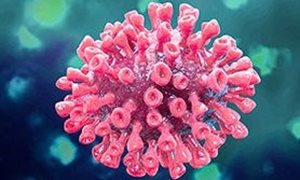13 June 2019
Almost all women will suffer from a vaginal yeast infection at one time in their life. It is rarely dangerous, but it can be stressful because of the itching and pain. The culprit is the fungus Candida albicans, which occurs naturally in warm damp places in the body, along with numerous other bacteria and fungi. Normally, the Candida fungus is quite harmless, but if the natural balance between the microorganisms is disturbed, it can start to grow rampant, resulting in infections.
In three to eight percent of women, these infections recur regularly, on average three times a year. These infections are perfectly treatable, time after time, but there is no definitive solution to this recurring problem. The question as to why some women are sensitive to these infections remains unanswered. Diabetes may play a role in this, just as long-term use of antibiotics or contraceptive pills, but none of these risk factors apply to the majority of women with recurrent infections. The properties of the fungus itself do not provide a conclusive explanation either.
Unknown gene
It may be possible that some women have a genetic predisposition to getting yeast infections. This has been researched before, but only on the basis of a few predefined genes that play a role in the immune response to Candida. This yielded only very few unambiguous results, which is why Martin Jaeger and his colleagues at Radboud university medical center compared the complete genetic profile of 155 women with and 172 women without susceptibility to Candida infections. They discovered that the SIGLEC15 gene plays an important role. “This gene isn't very well known,” explains Jaeger, “so relatively little research has been done. “
Surplus
The SIGLEC15 gene is active in various immune cells. It produces so-called lectin proteins that can bind to sugar molecules, including sialic acid that is located on the outside of fungal cells. As soon as lectin adheres to the fungus, the immune system can recognise and clean up the fungus. Jaeger: “Due to a defect in the SIGLEC15 gene, the immune cells do not recognise the fungus, and it can continue to grow. This causes more immune cells, but because they still do not recognise the fungus, it keeps coming back. This cycle keeps coming back, which means that the symptoms are not caused by a lack of immune cells, but rather a surplus of them.”
Recognition
The discovery of the SIGLEC15 gene provides more information about the cause of yeast infections, but does not offer a complete explanation, says Jaeger: "There are probably multiple genes involved in recurrent vaginal yeast infections. Not everyone with this SIGLEC15 gene mutation automatically gets infections. Many factors play a role, but we have now found an important factor that plays a role in recognising the Candida fungus.
For the treatment of vaginal yeast infections, it remains important to inhibit the immune system's overreaction, but Jaeger thinks it is difficult to cure the ailment definitively. “Because there is a genetic component to it, which - unfortunately - is difficult to eliminate.”
 Many women suffer from recurrent vaginal yeast infections. It is unclear why some women are more sensitive to this than others. Researchers at Radboud university medical center discovered that mutations in the SIGLEC15 gene play an important role in this. These mutations disrupt the immune response, wrote the researchers in Science Translational Medicine, published on 12 June.
Many women suffer from recurrent vaginal yeast infections. It is unclear why some women are more sensitive to this than others. Researchers at Radboud university medical center discovered that mutations in the SIGLEC15 gene play an important role in this. These mutations disrupt the immune response, wrote the researchers in Science Translational Medicine, published on 12 June.
Almost all women will suffer from a vaginal yeast infection at one time in their life. It is rarely dangerous, but it can be stressful because of the itching and pain. The culprit is the fungus Candida albicans, which occurs naturally in warm damp places in the body, along with numerous other bacteria and fungi. Normally, the Candida fungus is quite harmless, but if the natural balance between the microorganisms is disturbed, it can start to grow rampant, resulting in infections.
In three to eight percent of women, these infections recur regularly, on average three times a year. These infections are perfectly treatable, time after time, but there is no definitive solution to this recurring problem. The question as to why some women are sensitive to these infections remains unanswered. Diabetes may play a role in this, just as long-term use of antibiotics or contraceptive pills, but none of these risk factors apply to the majority of women with recurrent infections. The properties of the fungus itself do not provide a conclusive explanation either.
Unknown gene
It may be possible that some women have a genetic predisposition to getting yeast infections. This has been researched before, but only on the basis of a few predefined genes that play a role in the immune response to Candida. This yielded only very few unambiguous results, which is why Martin Jaeger and his colleagues at Radboud university medical center compared the complete genetic profile of 155 women with and 172 women without susceptibility to Candida infections. They discovered that the SIGLEC15 gene plays an important role. “This gene isn't very well known,” explains Jaeger, “so relatively little research has been done. “
Surplus
The SIGLEC15 gene is active in various immune cells. It produces so-called lectin proteins that can bind to sugar molecules, including sialic acid that is located on the outside of fungal cells. As soon as lectin adheres to the fungus, the immune system can recognise and clean up the fungus. Jaeger: “Due to a defect in the SIGLEC15 gene, the immune cells do not recognise the fungus, and it can continue to grow. This causes more immune cells, but because they still do not recognise the fungus, it keeps coming back. This cycle keeps coming back, which means that the symptoms are not caused by a lack of immune cells, but rather a surplus of them.”
Recognition
The discovery of the SIGLEC15 gene provides more information about the cause of yeast infections, but does not offer a complete explanation, says Jaeger: "There are probably multiple genes involved in recurrent vaginal yeast infections. Not everyone with this SIGLEC15 gene mutation automatically gets infections. Many factors play a role, but we have now found an important factor that plays a role in recognising the Candida fungus.
For the treatment of vaginal yeast infections, it remains important to inhibit the immune system's overreaction, but Jaeger thinks it is difficult to cure the ailment definitively. “Because there is a genetic component to it, which - unfortunately - is difficult to eliminate.”
Related news items

Trained immunity: a tool for reducing susceptibility to and the severity of SARS-CoV-2 infection
17 February 2021 In a review in Cell Mihai Netea, Frank van de Veerdonk, Reinout van Crevel and Jorge Dominguez Andres propose that induction of trained immunity by whole-microorganism vaccines may represent an important tool for reducing susceptibility to and severity of SARS-CoV-2. go to page
Invasive fungal infections in influenza and COVID-19
8 July 2020 The Aspergillus fungus is found in the lungs of many COVID patients. A parallel occurs with influenza patients, who often develop a serious fungal infection. Although such a serious fungal infection seems to occur less frequently in COVID-patients, alertness remains necessary, go to page
Trained immunity: a tool for reducing susceptibility to and the severity of SARS-CoV-2 infection
29 June 2020 In a review in Cell Mihai Netea, Frank van de Veerdonk, Reinout van Crevel and Jorge Dominguez Andres propose that induction of trained immunity by whole-microorganism vaccines may represent an important tool for reducing susceptibility to and severity of SARS-CoV-2. go to page.aspx?width=2120&height=1414&ext=.jpg&type=BlockColumn1Zoom1)
New insight into the effect of hydroxychloroquine undermines its use in corona
11 June 2020 Researchers at Radboud university medical center have discovered an as yet unknown effect of hydroxychloroquine. Raphael Duivenvoorden was interviewed in the program Op1 at NPO1 to elaborate on the findings. It seems unlikely that chloroquine has beneficial effect in corona infections. go to page
Terrestrial bacteria can grow on nutrients from space
26 May 2020 Researchers from the Radboudumc describe in an article in Astrobiology that bacteria can survive on an 'extraterrestrial diet', which affected their pathogenic potential. go to page
